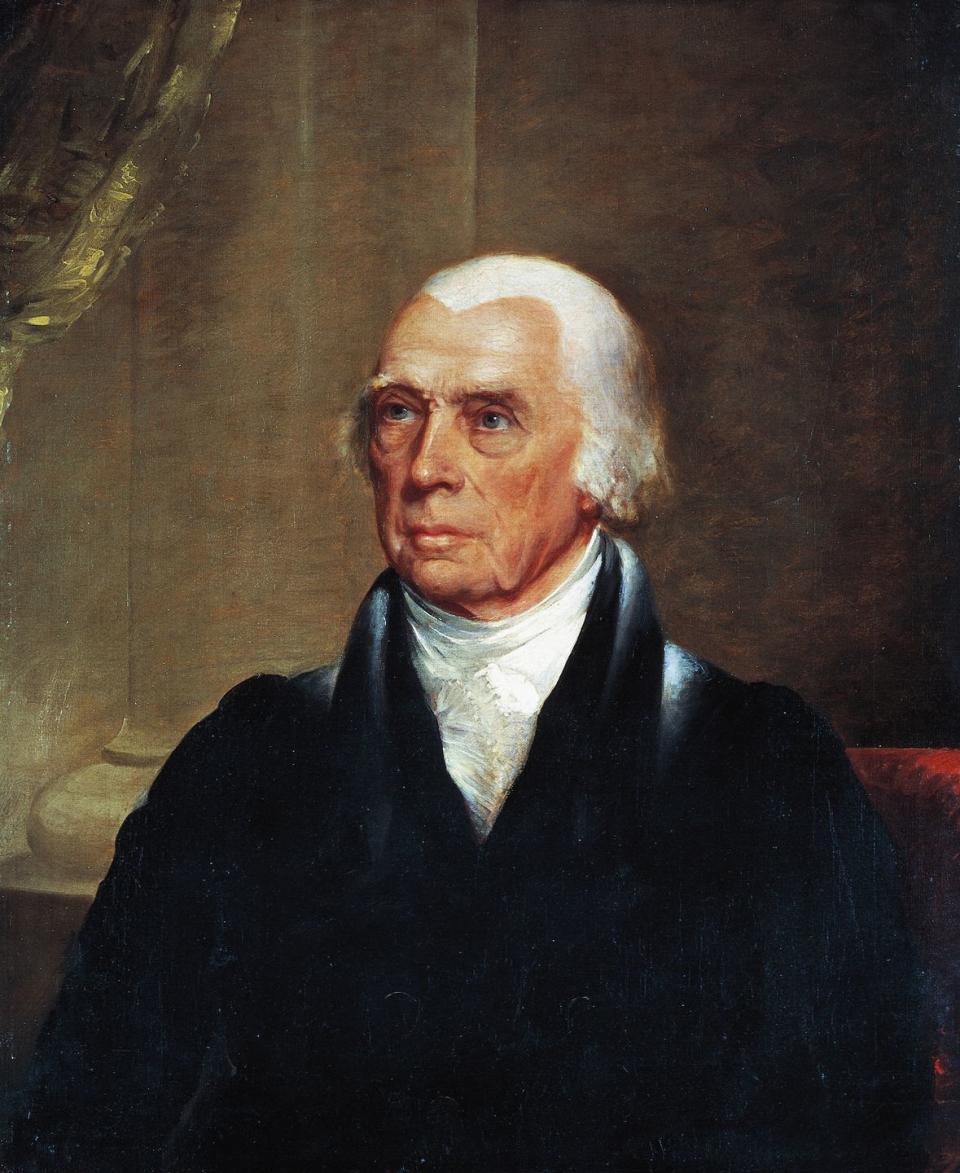The Senate Impeachment Trial Will Test the Dueling Theories of James Madison and Patrick Henry

WASHINGTON—The whole matter was never a sure thing. On June 14, 1788, in the Richmond Theater, delegates from all corners of Virginia set to debate the ratification of the new Constitution that had been produced, largely in secret, in a room in Philadelphia. Its main author, James Madison, faced formidable opposition at this ratifying convention, an opposition made even more formidable by the fact that it was led by no less an orator than Patrick Henry, who disliked Madison and who hated the Constitution that Madison had come to present.
Henry considered the entire Constitutional Convention to have been illegitimate. He objected to the Constitution from its first three words on down; Henry wondered why the preamble began with “We, The People,” and not “We, The States.” In truth, the convention had been a bit of a three-card monte game. It had been called to correct defects in the Articles of Confederation and, thanks to Madison and others, it instead had tossed the Articles into the Schuykill River. And since, without Henry’s rhetoric, there might not have been an American Revolution at all, his opinion carried no little weight. He inveighed against the whole business, raising the dreadful prospect of a tyrannical central government and, especially, that of an oppressive national executive.
If your American chief be a man of ambition and abilities, how easy is it for him to render himself absolute! The army is in his hands, and if he be a man of address, it will be attached to him, and it will be the subject of long meditation with him to seize the first auspicious moment to accomplish his design; and, sir, will the American spirit solely relieve you when this happens? I would rather infinitely — and I am sure most of this Convention are of the same opinion — have a king, lords, and commons, than a government so replete with such insupportable evils. If we make a king, we may prescribe the rules by which he shall rule his people, and interpose such checks as shall prevent him from infringing them; but the President, in the field, at the head of his army, can prescribe the terms on which he shall reign master, so far that it will puzzle any American ever to get his neck from under the galling yoke. I cannot with patience think of this idea.

If ever he violates the laws, one of two things will happen: he will come at the head of his army, to carry every thing before him; or he will give bail, or do what Mr. Chief Justice will order him. If he be guilty, will not the recollection of his crimes teach him to make one bold push for the American throne? Will not the immense difference between being master of every thing, and being ignominiously tried and punished, powerfully excite him to make this bold push? But, sir, where is the existing force to punish him? Can he not, at the head of his army, beat down every opposition? Away with your President! we shall have a king: the army will salute him monarch: your militia will leave you, and assist in making him king, and fight against you: and what have you to oppose this force? What will then become of you and your rights? Will not absolute despotism ensue?
The last sentence was a nifty turn of the knife. It echoed Thomas Jefferson’s line from the Declaration of Independence about “a long train of abuses and usurpation” evincing “a design to reduce them under absolute despotism.” Madison was not the orator that Henry was—hardly anyone ever was—but he was prepared, as he always was. He countered:
There is one security in this case to which the gentleman has not averted; if the President be connected, in any suspicious manner, with any person, and there be grounds to believe he will shelter him, the House of Representatives can impeach him; they can remove him if found guilty; they can suspend him when suspected, and the power will devolve on the vice-president...This is a great security.
With the able assistance of George Mason, Madison carried the argument, the day, and, eventually, the vote on ratification. And here we are, 232 years later, testing the theories of both men.

Instead of the actual standing military that Henry feared, a criminal president* has mustered an army of sycophants, cowards, criminals, and bounders to defend him from the proper constitutional judgment of his conduct. And Madison’s faith in the Constitutional remedies is being tested even more vigorously. The House has done its duty and, by all indications, alas, the Senate majority, under the leadership of Mitch McConnell, has abandoned the field and joined the ranks of the supine and worthless. Every inherent danger that Henry saw in the proposed national executive has come to vivid life, and every safeguard upon which Madison assured the people of the country they could rely has utterly collapsed.
The stage for the farce was set Monday night, when McConnell predictably reneged on months of promises that the impeachment trial would be held according to the rules set by the Senate in 1999 when it considered the case against President Bill Clinton. Instead, McConnell arranged matters so that the trial will be an exercise in accelerated kabuki, something between a Soviet election and a 1930s dance marathon. From Talking Points Memo.
The Senate is not going to automatically enter the House evidence into the trial record. A senior Republican leadership aide concedes this is a different provision from the Clinton impeachment proceeding because “the White House was denied due process throughout the 12 weeks of partisan House proceedings.”
After the period for senators’ questions, the Senate will hold an up or down vote on whether to even allow witness subpoenas. If witnesses and document subpoenas are allowed, then the two sides may make motions to issue subpoenas which will also be subject to Senate votes. So that first hurdle will be a key one.
McConnell is shortening the time in which opening arguments may be given to two Senate days per side. The amount of time remains the same as the Clinton impeachment but constricted to a narrower window, forcing either long days or an abbreviated argument.
You have to admit. That first one is a very loud and definitive “Fck You” to the House, and to the constitutional order. For example, there has to be a vote on whether to admit the testimony of, say, Fiona Hill or Marie Yovanovich. The constricted debate time guarantees that a good portion of whatever evidence is under debate will take place in the post-Kimmel hours of the day. When Chuck Schumer talks about skulduggery in the dark of night, he’s not kidding. The country could get sold to Somali pirates and nobody would know until breakfast the next morning.
Neither Patrick Henry nor James Madison would recognize what is going on in Washington this week. They certainly wouldn’t recognize it as either patriotism or as the workings of a functioning democratic republic. But they would recognize the perils of it, and they would see the foul machinations of illegitimate power beneath the trappings of legislative farce. Those who would destroy self-government must first make it seem ridiculous. We’re more than halfway there.
Respond to this post on the Esquire Politics Facebook page here.
You Might Also Like


